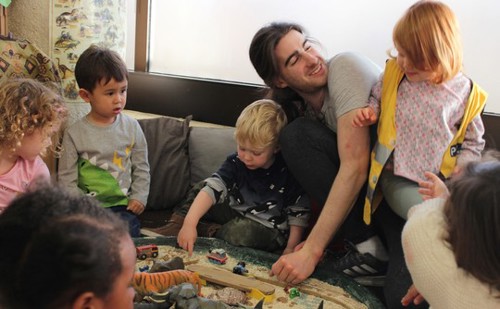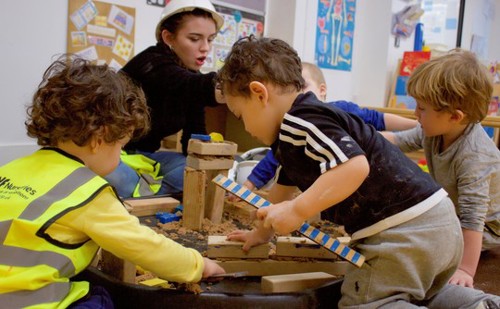
It’s an early evening in November and in a building just off Regent Street, there’s a gathering of nursery staff from London Early Years Foundation (LEYF).
They are here for this early years organisation’s annual debate. This year it is being chaired by Dr. Paul Ramchandani, professor of play at Cambridge University, the topic is ‘why we should encourage more men into childcare’.
LEYF is a pioneer campaigner for more men to become early years teachers, but this evening it’s looking at that issue from another perspective. The child’s perspective.
Leading the debate is Dr. Helen Perkins, a senior lecturer in childhood and family studies at the University of Wolverhampton. Helen’s here to share the latest findings from the research LEYF has been carrying out at its nurseries into how children respond to male and female early years teachers.

Children choose people not genders
The main finding of the research is that girls and boys link activities to the practitioner they think is ‘best’ at that activity, regardless of their gender.In some settings the findings fit with the usual gender stereotypes, including children associating literacy activities such as singing and stories with female staff. But the evidence shows that this is influenced by the nursery staff’s own views.
Helen pulls up a slide of quotes from children explaining why they picked different workers for their favoured activities. Among them:
– “He cooks in the mud kitchen.”
– “She can hold a spider and not be scared.”
– “He can wear the Elsa dress with me.”
The message is clear, says Helen: “It is the attitude and attributes of the teacher that provide a rich learning environment and allow all children to embrace positive non-stereotypical gendered behaviours.”
Snuggle times
LEYF chief executive June O’Sullivan says the social enterprise is already encouraging this within its 37 London nurseries.If nursery staff of both sexes lead activities that are typically seen as the preserve of the opposite gender, those activities become de-gendered in children’s eyes.
“Our unique early years pedagogy includes activities like Drag Queen Story Time that encourage children to accept themselves for who they are,” says June. “We want to be a place where men and women are seen doing whatever needs doing, regardless of gender. There are no gender-defined roles within LEYF.”
LEYF has also created cosy spaces with sofas in its nurseries for ‘snuggle times’ where staff read to and with the children to encourage a more gender-neutral reading culture among the nearly 4,500 children it cares for.

Picking up worms
June says this work is vitally important for children’s futures: “At this early stage of their development, children have a unique opportunity to make up their own minds about what boys and girls can do. Without balance, social norms can reduce children’s choices, aspirations and social achievements.
“Perpetuating gender stereotypes leads boys to reject nurturing and caring careers and limits girls’ potential for careers in science, technology, engineering and maths. It’s about giving all children choice and that’s why we are so passionate about this.”
To achieve that balance, LEYF poses itself questions designed to keep unconscious gender bias in check, including:
– When did you last review how gendered your practice is?
– How do you structure story time?
– When you have one male staff member, is he the novelty?
– Is there a subtle difference in the language used by male and female staff?
– Is snuggle time with all staff encouraged in your setting?
“We’re creating a truly inclusive environment where staff model behaviour in a more conscious non-gendered way,” says June. “We want and need all our staff, no matter their gender, to pick up worms, plait hair, fix broken equipment, dress up, play football and crawl under garden bushes.”
*photo credits: ©LEYF/Isabelle Johnson

